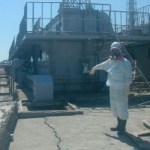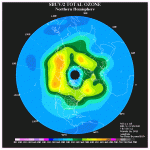Environment
Today is the first day of our Adapting in Place Class - if you are interested I still have 2 paid spots ($175 for the six week online asynchronous class - or equivalent barter) and have had two scholarship spots open up for low income participants (one through someone not taking a spot and one, kindly through donation!) . Please email me at jewishfarmer@gmail.com if you'd like to join the class. You can see the syllabus two posts down.
So what is Adapting In Place anyway? I'm writing a book about it (coming out next fall), I talk about it a lot, but what exactly am I getting at? It is…
I'm afraid I don't have access to this specialty journal, Curator: The Museum Journal, so it's a good thing the author sent me a copy of his article on the modern treatment of human origins in museums. It's amusing, since part of it is a substantial comparison of the exhibits at the American Museum of Natural History in New York and the Smithsonian in Washington DC, but there is also a thorough discussion of Ken Ham's Creation "Museum" in Kentucky. The Creation Museum does not come off at all well.
Asma highlights a couple of things that leapt out to me, as well. It's not really a museum —…
Logging the Onset of The Bottleneck Years
This weekly posting is brought to you courtesy of H. E. Taylor. Happy reading, I hope you enjoy this week's Global Warming news roundup
skip to bottom Another week of Climate Disruption News Sipping from the Internet Firehose...April 3, 2011 Chuckles, Fukushima Heroes, Fukushima News, Nuclear Policy, Fukushima Talk BEST, Thermodynamics, Cook, Earth Hour Melting Arctic, Polar Bears, IPY, Antarctica Food Crisis, Food Prices, Food vs. Biofuel, Ecological Services, GMOs, Food Production Hurricanes, GHGs, Temperatures, Feedbacks,…
Despite the deafening silence from TEPCO regarding questions over a physical breech in Reactor 2, it is now generally being considered that there is a breech in reactor 2. It is not clear if it is a hole in the containment vessel of some kind or just some disconnected or cracked pipes. Experts are estimating the percent of fuel in the reactors that were active at the time of the quake that has been damaged as fairly high (over half). The most significant news over the last several hours is probably the identification of a major route by which radioactive water is leaking from Reactor 2…
I realize this is two weeks old, but I had this hanging around, making it still worthwhile to discuss, because it's been bothering me, and last week Coulter wrote a blisteringly stupid followup to her blisteringly ignorant column from two weeks ago entitled A Glowing Report on Radiation. She wrote this article in the wake of the fears arising in Japan and around the world of nuclear catastrophe due to the damage to the Fukushima nuclear power plant caused by the earthquake and tsunami that hit northern Japan on March 11. Coulter was subsequently interviewed by Fox News pundit Bill O'Reilly on…
One of the issues I've discussed repeatedly is how resources--money--need to be shifted from data generation to data processing and analysis. This report about the Earth Microbiome Project, which will characterize 10,000 environmental (e.g., soil, water) samples is encouraging. Someone must have learned something from the last few years of microbiome work:
The sequencing aspect of the project is estimated to only account for about 10 percent of the total cost, with analysis and computation making up the bulk of the expense, said Meyer.
More like this please.
By Dr. Jon Jenkins; Carl Sagan Center for the Study of Life in the Universe, SETI Institute, and Gail Jacobs
Dr. Jon Jenkins of the SETI Institute is the Analysis Lead for NASA's Kepler Mission. He heads up a group of about two-dozen scientists and programmers who designed and built the software that is the brains behind this dramatic search for other worlds. With a photometric precision of 20 parts per million, Kepler is able to discover planets that are the same size as the rocky, inner orbs of our own solar system. By making an inventory of such worlds, Kepler will answer one of the most…
Posting will be intermittent and light this week. It is time for spring cleaning around here - pretty much a full time job. Not only is there Pesach coming to motivate me, and my next home visit in the foster/adoptive parent prep cycle, but also there's the fact that our weirdly cold spring is supposed to warm up, at least a bit. Once the weather hits the 50s with any regularity, and the garden season starts, it is all "House? What house? Who even goes into the house anymore?" Add to that the fact that we've hit the critical "8 weeks before last frost" date in the life of a grower, and…
Logging the Onset of The Bottleneck Years
This weekly posting is brought to you courtesy of H. E. Taylor. Happy reading, I hope you enjoy this week's Global Warming news roundup
skip to bottom Another week of Climate Disruption News Logging the Onset of The Bottleneck YearsMarch 27, 2011 Chuckles, Fukushima Heroes, Bad News, Fukushima Reactions, Fukushima Talk WWD, WMD, Earth Hour, WikiLeaks, Young, Ruddiman Bottom Line, UNGCF, The Question, Effectiveness, Cook, BEST Melting Arctic, Geopolitics, Antarctica Food Crisis, Food Prices, Food vs. Biofuel, Land Grabs, GMOs,…
Ozone levels over the Arctic as detected by satellite on March 16. Credit: NOAA
This is the ozone hole like you've never seen it before.
Is the ozone hole related to climate change or the "greenhouse effect"? In a word, no.
What about Global Weirding (Thomas Friedman's phrase for increasingly extreme weather conditions)? Possibly not.
First, some background: {my emphasis shown in bold}
The Antarctic Ozone Hole was discovered by the British Antarctic Survey from data obtained with a ground-based instrument from a measuring station at Halley Bay, Antarctica, in the 1981-1983 period. They…
Logging the Onset of The Bottleneck Years
This weekly posting is brought to you courtesy of H. E. Taylor. Happy reading, I hope you enjoy this week's Global Warming news roundup
skip to bottom Another week of Global Warming News Information is not Knowledge...Knowledge is notWisdomMarch 20, 2011 Chuckles, Equinox, Fukushima Reactions, Fukushima Talk, Inspiration, WikiLeaks Bottom Line, Thermodynamics, Attribution, Google, Sock Puppetry, Cook Melting Arctic, Methane, Geopolitics Food Crisis, Food Prices, Land Grabs, GMOs, Food Production Hurricanes, GHGs, Carbon Cycle,…
I'm almost weary of blogging about nuclear power. But others are still going strong. Take the Globe and Mail's Doug Saunders, who writes this week that we shouldn't even think of abandoning the technology. Such enthusiasm is particularly curious because he glosses over the Achilles heel of nukes -- the cost -- and Canada has one of the most expensive varieties of nuclear reactors around.
I can only assume that Saunders hasn't done enough research, because if he had he would never come to conclusions such as this:
It may be possible in Europe and North America to talk about reducing consumer…
It will probably be some years before we get the full story of what happened at the Fukushima Daiichi reactor complex after the earthquake.
Information has not exactly been put out coherently or comprehensively, but we can make some inferences from the data that is out there.
It is likely that one or two reactor vessels were breached with release of fuel and radioactive ash into the containment vessel.
There are a lot of nuclear agencies in Japan:
the JAEA - Japan Atomic Energy Agency - whose online environmental radiation monitors are now online (Oarai is the interesting one, between…
That reputable scientist, Ann Coulter, recently wrote a genuinely irresponsible and dishonest column on radiation hormesis. She claims we shouldn't worry about the damaged Japanese reactors because they'll make the locals healthier!
With the terrible earthquake and resulting tsunami that have devastated Japan, the only good news is that anyone exposed to excess radiation from the nuclear power plants is now probably much less likely to get cancer.
This only seems counterintuitive because of media hysteria for the past 20 years trying to convince Americans that radiation at any dose is bad.…
... continuing ..
Good news and bad news, mostly just uncertain news. A cable needed to power equipment has been installed. It turns out that one of the reactors uses Plutonium. Ooops.
Cable reaches Japan nuclear plant
Fukushima on Thursday: Prospects starting to look good 'Worst probably over'
The story of the quake- and tsunami-stricken Fukushima Daiichi nuclear powerplant continues to unfold, with reports suggesting that the situation with respect to the three damaged reactors at the plant may soon be stabilised without serious consequences. The focus of attention has now moved to…
there are a number of questions that need answer regarding the situation at the Fukushima Daiichi nuclear reactor, aka Fuk-D.
As a starting point, here is an amateur online feed of radiation in Tokyo (Park18).
It is a geiger-counter, the normal count rate is 10-20 cpm, around noon on march 15th the count rate peaked at about 120 cpm, the counts then dropped before there was another broad rise on march 16th to about 40 cpm.
The first question is: why am I having to link to an amateur with a geiger counter?
The Japanese Atomic Energy Authority has four online environmental radiation monitors.…
I honestly think that it is too early to have this conversation, but alas, the conversation has been forced.
I have yet to express my opinion about the efficacy or safety of the future use of nuclear power, or any way in which that opinion may be affected by the current tragic events in Japan. I did report (link to, really) with little comment on the current failings of the Fukushima nuclear plants (very much underway at this time), and when commenters took the opportunity to explain how nuclear power is totally safe and that this was demonstrated by how nicely things are working out at…
As you presumably know by now, the earthquake in Japan damaged a series of nuclear reactors at the Fukujima Daiichi plant. Due to damage from the earthquake and subsequent tsunami, safety systems failed and the reactors could not be shut down the way they were supposed. Hydrogen gas built up and several buildings surrounding the reactor cores have exploded, though the reactor cores themselves seem to be holding up (there is some reporting now that the core of one reactor may have been breached, but it's still unconfirmed whether that's true, or how extensive the breach might be if so). It'…
A Defense of Nuclear Power As a Second Best Option
In light of the nuclear power plant partial meltdowns in Japan, there are calls for not expanding the U.S. nuclear power plant capacity, and even shutting down existing plants. What bothers me about this is that there is no discussion of how we make up the energy production shortfall...
Read the rest at MTMB
The Fukushima legacy
At one end of the hyperbole scale we have Helen "If you love this planet" Caldicott, who raises the specter of "cancer and genetic diseases" if things get any worse at the growing list of nuclear power reactors…
Logging the Onset of The Bottleneck Years
This weekly posting is brought to you courtesy of H. E. Taylor. Happy reading, I hope you enjoy this week's Global Warming news roundup
skip to bottom Another week of Climate Disruption News Information Overloadis Pattern RecognitionMarch 13, 2011 Chuckles, Abraham et al., Fukushima, The Question, WikiLeaks Bottom Line, Thermodynamics, Cook, Post CRU Melting Arctic, Geopolitics, Antarctica Food Crisis, Food Prices, Food Riots, Food vs. Biofuel, GMOs, Food Production Hurricanes, GHGs, Aerosols, ENSO, State of the Oceans,…


